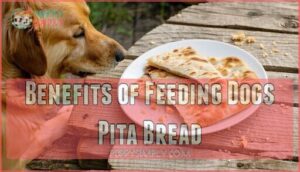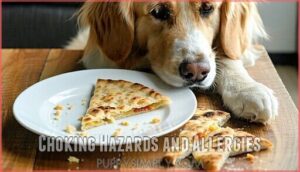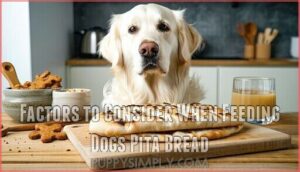This site is supported by our readers. We may earn a commission, at no cost to you, if you purchase through links.

The main concerns are salt content and wheat allergies – some pups can’t handle gluten just like their humans.
Skip flavored varieties with garlic, onions, or excessive seasonings, as these can be toxic.
Watch for signs of stomach upset after your dog’s first pita experience, and remember that a few torn pieces are plenty.
While pita won’t harm most dogs, it’s basically empty calories without nutritional benefits, and the real safety secrets lie in knowing which ingredients to avoid and how much is too much.
Table Of Contents
Key Takeaways
- Plain pita bread is generally safe for dogs in small amounts, but you should avoid flavored varieties containing garlic, onions, or xylitol since these ingredients are toxic to your pup.
- Check for wheat allergies and gluten sensitivities before offering pita bread, as some dogs cannot handle these ingredients and may experience digestive upset or skin irritation.
- Treat pita bread as an occasional snack, not a regular treat – it is essentially empty calories without nutritional benefits for your dog’s diet.
- Always give small, bite-sized pieces to prevent choking hazards, and monitor your dog for any signs of stomach upset after their first pita experience.
Can Dogs Eat Pita Bread?
You’re probably wondering if you can share that leftover pita bread with your furry friend without any worries.
While plain pita bread isn’t toxic to dogs, it’s not exactly a health food for them either.
Think of it as an occasional treat rather than a regular snack.
Problematic Pita Bread Ingredients
Recognizing toxic additives in pita bread protects your dog from serious health risks.
Know your pita ingredients – your dog’s life depends on it.
Garlic poses severe dangers, causing hemolytic anemia by destroying red blood cells.
Onion poisoning occurs similarly, with both ingredients being particularly concentrated in powdered forms.
Xylitol dangers lurk in sweet pita varieties, potentially causing kidney failure within hours.
Commercial pita often contains excessive salt, leading to sodium poisoning.
Yeast hazards emerge from raw dough, which expands dangerously in your dog’s stomach.
Dogs with wheat allergy or gluten sensitivity face additional risks including digestive upset, itching, and diarrhea.
Always check ingredient labels carefully before sharing.
For safe feeding practices, consider dog food safety guidelines to protect your pet.
Can Dogs Eat Hummus?
The temptation to share hummus with your furry friend might feel overwhelming, but this popular dip poses serious health risks.
Most commercial hummus contains garlic and onions, which are toxic to dogs and can cause red blood cell damage leading to anemia.
Here’s what makes hummus dangerous for dogs:
- Garlic toxicity – Can trigger thiosulfate poisoning and organ damage
- Onion compounds – Cause gastrointestinal upset and blood-related issues
- High salt content – Leads to dehydration and electrolyte imbalance
- Lemon juice – Irritates digestive systems, causing vomiting or diarrhea
- Added seasonings – Cumin and paprika further upset sensitive stomachs
Even small amounts can trigger serious reactions.
If you’re wondering "can dogs eat pita" with hummus, the answer is no.
Plain cooked chickpeas offer chickpea safety without harmful hummus ingredients.
For healthy alternatives that support proper canine digestion and dog nutrition, stick to carrots or cucumbers instead.
Understanding dog food safety is vital to prevent such risks.
Can Dogs Eat Cheese?
Pairing pita bread with cheese creates a tasty combination, but understanding cheese safety for dogs is vital. While cheese isn’t toxic to dogs, it comes with important considerations that every pet owner should know.
Most dogs can enjoy small amounts of cheese, but dairy allergies and lactose intolerance affect many pups. These conditions can cause digestive upset, including diarrhea, gas, and vomiting. Blue cheese and varieties with garlic or herbs are dangerous and should never be given to dogs.
When considering the risks of cheese for dogs, researching dog cheese safety is necessary to make informed decisions.
| Safe Cheese Types | Risky Cheese Types | Warning Signs |
|---|---|---|
| Cottage cheese | Blue cheese | Vomiting |
| Mozzarella | Feta | Diarrhea |
| Swiss | Garlic-flavored | Excessive gas |
When considering pita bread for dogs alongside cheese, moderation is key. Cheese should never exceed 10-15% of your dog’s daily calories. Dogs with pancreatitis, kidney disease, or weight issues should avoid cheese entirely. Always monitor your pup for adverse reactions and consult your veterinarian about incorporating cheese into their diet safely.
Is Pita Bread Safe for Dogs?
Plain pita bread is generally safe for dogs when given in small amounts as an occasional treat.
However, you’ll need to check ingredients carefully and make certain the bread is fully baked to avoid potential health risks.
Avoid Toxic Ingredients
Four toxic ingredients can turn a simple pita bread into a dangerous meal for your dog.
Even plain pita bread can hide deadly surprises for your dog.
Xylitol, an artificial sweetener, causes rapid insulin release and can lead to seizures** or liver failure within thirty minutes.
Garlic contains thiosulfate, which damages red blood cells—even small amounts can cause food poisoning and anemia.
Chocolate chips contain theobromine that dogs can’t process, leading to serious pet nutrition issues.
Raisins are perhaps the most dangerous, causing sudden kidney failure from just one piece.
Dog allergies to wheat are common, but toxic foods pose immediate life-threatening risks.
Always read ingredient labels carefully before sharing pita bread.
When in doubt, stick to proven safe treats like plain carrots or apples.
Your dog’s health depends on avoiding these hidden dangers that manufacturers often include in flavored breads.
It’s vital to understand dog safe options to guarantee your pet’s well-being.
Keep It Well-Baked
Well-baked pita bread is your safest bet when sharing this treat with your dog.
Raw or undercooked dough poses serious risks – the yeast can expand in your dog’s stomach, causing dangerous bloating.
Always let pita bread cool completely before offering it as one of your dog’s safe treats.
When selecting baked goods for your pup, stick to plain varieties without added seasonings.
For dogs with wheat allergies, gluten-free pita options work better for their dog nutrition needs.
Remember these baking tips: check that the bread is fully cooked through and avoid any with visible raw spots.
Can dogs eat pita safely?
Yes, but only when it’s properly baked.
Pita bread for dogs should be plain and cooled.
Monitor your dog’s pita consumption – even safe pita bread dogs can enjoy should be limited to prevent digestive upset.
It’s vital to understand dog food risks when introducing new treats to their diet.
Benefits and Risks of Feeding Dogs Pita Bread
While pita bread won’t harm your dog in small amounts, it’s basically empty calories with no real nutritional benefits.
You’ll need to watch for potential choking hazards and allergic reactions, especially if your pup has wheat or gluten sensitivities, which can be considered allergic reactions.
Benefits of Feeding Dogs Pita Bread
While pita bread isn’t toxic to dogs, it’s worth noting that the "benefits" are quite limited compared to proper dog nutrition.
Here’s what you should know about pita bread for dogs: Pita Nutrition offers minimal value for Canine Health. Unlike what some sources claim, pita bread doesn’t provide essential nutrients your dog needs. Think of it like giving your kid candy instead of vegetables – it won’t hurt occasionally, but it’s not doing much good either.
The modest advantages include:
- Fiber content – May support Dog Digestion in small amounts, though your dog’s regular food already provides adequate fiber
- Easy portability – Convenient for training treats when you’re out and about
- Low fat content – Won’t immediately spike calorie intake like some human foods
However, safe pita for dogs means plain, unseasoned varieties only. Commercial pita often contains excess sodium that doesn’t benefit Pet Safety. Consider proven Bread Alternatives like carrots or apple slices instead – they’re more nutritious and equally convenient for dogs eating pita-sized portions.
Choking Hazards and Allergies
While pita bread might seem harmless, choking risks and food allergies pose real concerns for your furry friend.
Bread can expand and clump together in your dog’s mouth, creating choking hazards—especially for dogs that gulp their food without chewing thoroughly.
This texture becomes particularly problematic when dogs swallow large pieces whole.
Wheat allergy affects roughly 13% of dogs with adverse food reactions, making pita safety dogs should consider carefully.
Signs of gluten sensitivity include itching, diarrhea, and skin irritation.
Dogs and pita don’t always mix well, as digestive issues can develop quickly after consumption.
Pita allergies manifest through vomiting, bloating, and discomfort.
Always break bread into small, manageable pieces to minimize choking hazards.
Monitor your dog closely after introducing any new food—their reaction tells you everything you need to know about whether can dogs eat pita safely in their specific case.
Understanding dog food toxicities is vital for preventing adverse reactions.
Factors to Consider When Feeding Dogs Pita Bread
Before you share pita bread with your dog, you’ll need to examine three important factors that can make the difference between a safe treat and a potential health risk.
The amount you give, the type of pita bread you choose, and your dog’s individual health status all play vital roles in keeping your furry friend safe and healthy.
Give Small Amounts
When serving pita to your dog, think of it like sharing dessert—less is definitely more. Proper portion control means limiting pita to small, bite-sized pieces that won’t overwhelm your pup’s system or contribute to weight gain.
Follow these feeding guidelines for dog pita safety:
- Stick to calorie limits – Keep pita under 10% of daily calories
- Watch for digestive issues – Stop if stomach upset occurs
- Practice moderation – Offer only as occasional treats
- Consider healthy alternatives – Fresh fruits make better snacks
Many owners also think about dog pita treats as a way to think about their dog’s diet. Can dogs eat pita? Yes, but dog treat moderation prevents problems.
Type of Pita Bread
When selecting pita bread for dogs, whole wheat offers better nutritional value than white pita, providing fiber and essential nutrients.
Plain bread without seasonings, garlic, or onions is safest for pita safety dogs. Commercial pita bread often contains excess sodium, so check labels carefully.
Toasted pita can be easier to digest than soft varieties. If your dog has grain sensitivities, gluten free options are available, though plain pita should still be given sparingly as an occasional treat.
For a healthy option, consider whole wheat pita online shopping sources to find the best products.
Your Dog’s Health
Before feeding your dog pita bread, you’ll want to assess their individual health needs since certain conditions can make even plain bread problematic.
Dogs with chronic health issues face higher risks when consuming high-carbohydrate treats like pita.
Consider these health factors for pita safety dogs:
- Diabetes or obesity: High-carb pita can worsen blood sugar control and weight gain
- Food allergies: Wheat sensitivity may trigger itching, diarrhea, or digestive upset
- Sensitive stomachs: Puppies and dogs with compromised digestion shouldn’t have pita
- Pancreatitis history: Even plain bread can trigger flare-ups in susceptible dogs
- Lactose intolerance: Affects dog pita consumption if cheese toppings are involved
Canine nutrition experts recommend prioritizing healthy treats over bread-based snacks.
Dog nutrition should focus on species-appropriate foods rather than human convenience foods.
Canine wellness depends on veterinary care guidance—consult your vet before introducing pita, especially for dogs with existing health conditions.
Pet safety means understanding your dog’s unique needs.
It’s vital to understand bread safety guidelines to safeguard your dog’s health and well-being.
Frequently Asked Questions (FAQs)
Can dogs eat bread?
Yes, dogs can eat plain bread in small amounts as an occasional treat.
Choose whole wheat over white bread, avoid toxic ingredients like garlic or xylitol, and limit portions to prevent digestive upset and weight gain.
Can dogs eat peach pits?
Before the printing press, peach pits were nature’s toxic timebombs.
You can’t give your dog peach pits—they contain cyanide compounds that are toxic.
The hard pit also creates choking hazards and intestinal blockages.
Contact your vet immediately if your dog eats one.
Can dogs eat potatoes?
Dogs can safely eat plain, cooked potatoes in moderation.
Avoid raw potatoes, green potatoes, and potato skins, which contain solanine—a toxic compound.
Sweet potatoes are actually healthier alternatives, providing fiber and vitamins for your furry friend.
Can dogs eat tuna?
Cautious, careful, considered—that’s your approach to tuna.
Small amounts of tuna won’t cause mercury poisoning, but high mercury levels mean you should offer it rarely.
Never serve raw tuna due to bacteria risks.
Stick to occasional, tiny portions, and be careful with the amount you serve.
Can dogs eat macadamia nuts?
Never feed your dog macadamia nuts—they’re toxic and can cause vomiting, weakness, lack of coordination, and overheating within hours. Even small amounts trigger serious symptoms requiring immediate veterinary care.
Can dogs eat grapes?
Grapes are highly toxic to dogs and can cause kidney failure or death. No safe dose exists — contact your vet immediately if your dog eats any grapes.
Is pita safe for dogs?
Yes, you can safely give your dog plain pita bread in small amounts as an occasional treat. However, avoid pita containing garlic, onions, or xylitol, which are toxic to dogs.
Can dogs eat pita and hummus?
Plain pita bread is generally safe for dogs in small amounts, but hummus isn’t recommended. Most hummus contains garlic, which is toxic to dogs and can cause serious health issues.
Can my dog have a pita chip?
Pita chips can be given to your dog occasionally, but they’re not ideal treats.
Most commercial pita chips contain high salt levels and added seasonings that aren’t healthy for dogs, potentially causing digestive upset or increased thirst.
What bread is ok for dogs?
Most breads are safe for dogs in small amounts.
Plain white, wheat, and whole grain varieties work best.
Skip bread with raisins, garlic, onions, nuts, or xylitol – these ingredients are toxic to dogs.
Conclusion
Ultimately, the question "can dogs eat pita" has a measured answer.
While plain pita bread won’t cause immediate harm to most canines, it’s basically nutritional deadweight in their diet.
You’ll want to stick with small portions, avoid seasoned varieties completely, and monitor your pup for any digestive sensitivities.
Remember that your dog’s regular food provides everything they need nutritionally, think of pita as an occasional treat rather than a dietary staple—your furry friend deserves better nutrition.











